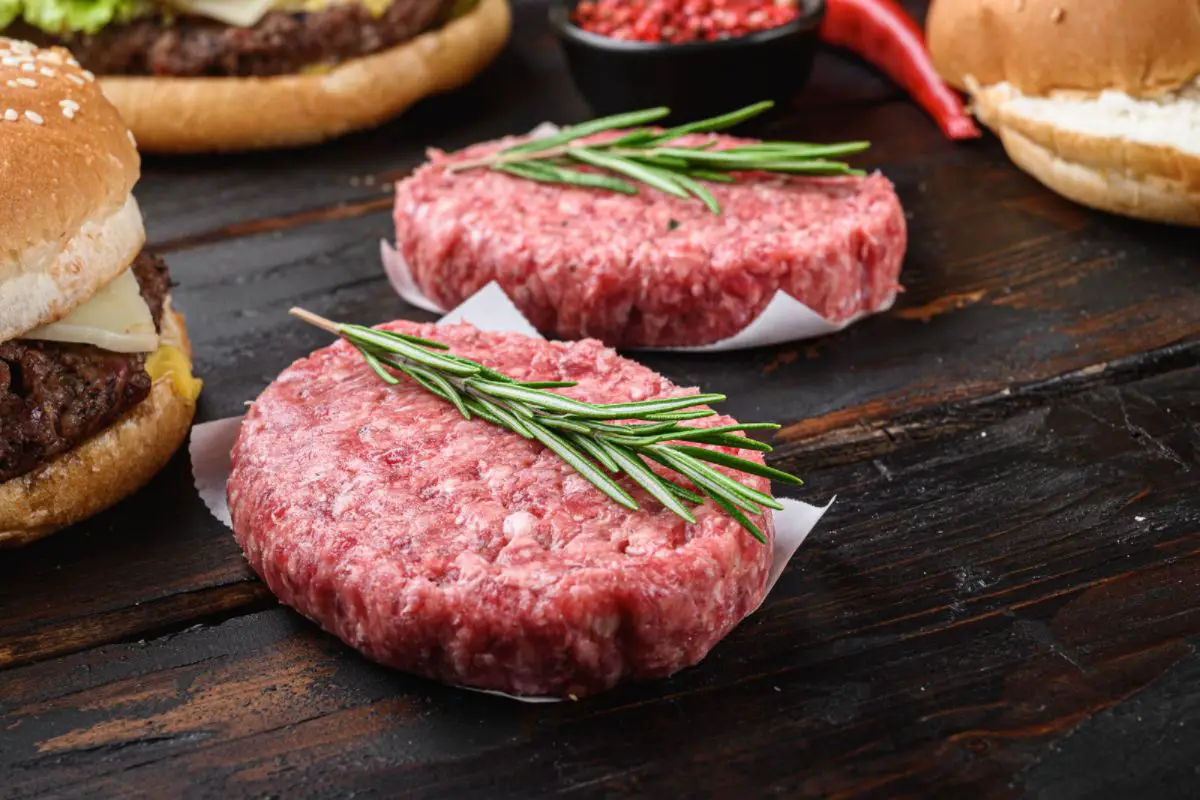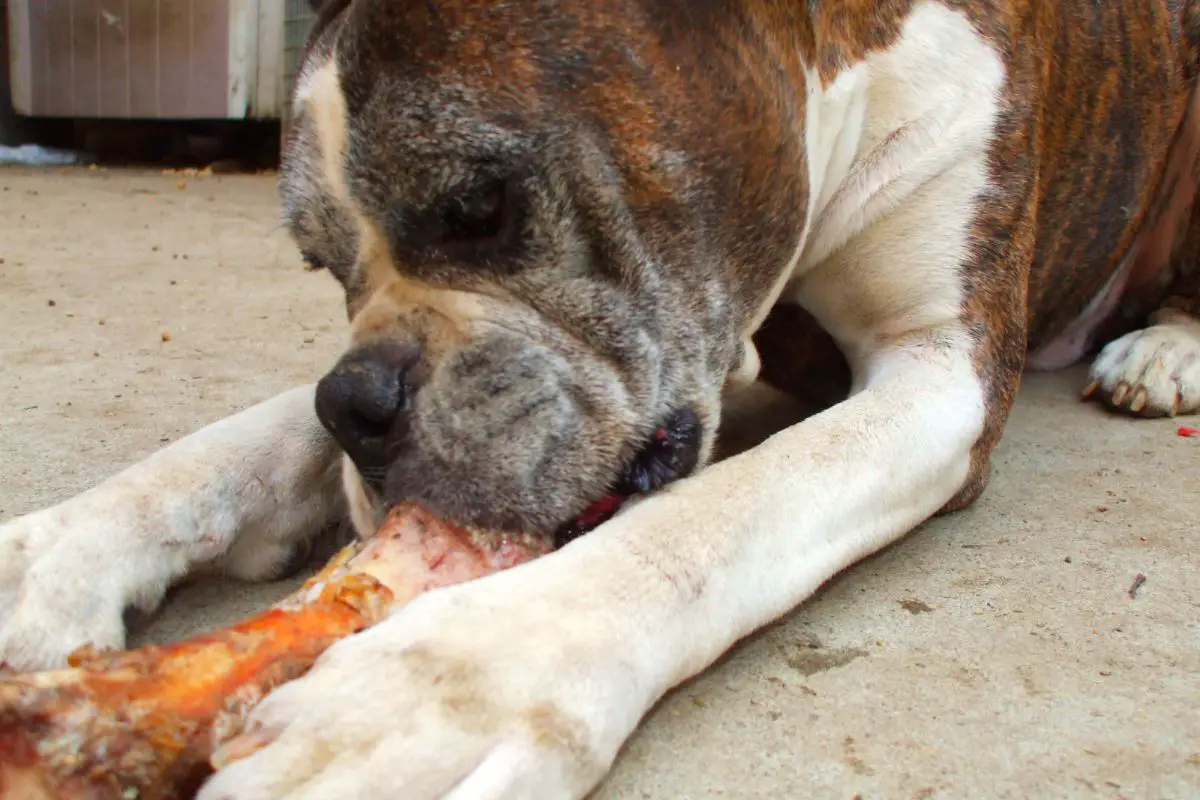This post contains affiliate links.
Dogs are infamous for trying to eat all kinds of foods. You might occasionally feed your dog a bit of hamburger from the dinner table, or maybe your pet will steal a scrap or two when you’re at the grill. Still, this leaves you wondering, can dogs eat hamburger meat without harm?
Dogs can eat hamburger meat if the meat is fresh and unseasoned. Also, there cannot be any traces of onion or garlic in the meat, as these vegetables can prove fatal to dogs. Lean hamburger meat is safe for dogs to eat in moderation as part of a balanced diet.
This article will explain why hamburger patties are safe for canine consumption and how they can affect animal health. Additionally, I will tell you how to prepare hamburger meat for your pet if you plan to include it in their diet.
Is Hamburger Good for a Dog’s Diet?
Before your dog takes a bite of that hamburger, it is good to know the nutritional content of the meat. What might be safe for humans might not sit well in your furry friend’s tummy.
Hamburger meat can be good for a dog’s diet as long as pet owners take care not to select meat that is too fatty or has added seasonings. Feeding cooked, unseasoned, lean meat to your pet is the healthiest way to include hamburger meat in a dog’s diet.
Ground beef is often recommended for dogs because it is high in protein. Cooked ground beef contains many vitamins, minerals, and essential amino acids that benefit a dog’s long-term health. However, hamburgers alone do not constitute a full meal and need to be supplemented with other food groups.
Check the Label Before Feeding Hamburger to Your Dog
Hamburger meat is essentially ground beef shaped into patties. But did you know the USDA has separate inspection criteria for “ground beef” and “hamburger”? According to food safety regulations, ground beef and hamburgers can have a maximum of 30% fat, but only the fat content in hamburgers can be increased further to reach the desired level.
Remember to check the label before purchasing hamburger meat as pet food. Some may have inconspicuous ingredients that are only printed on the label and not on the front of the pack.
How To Make Hamburger Meat Safe for Dogs
- The varying fat levels of hamburgers sold at retail stores mean that you have to watch out for meat that may be too fatty for canines. Lean hamburger meat is the best choice, preferably with a lean-to-fat ratio of 90:10.
- When serving hamburger meat to dogs, check that the meat is fresh and free from seasonings. Keep away from anything processed because this causes the pancreas to work harder, which can cause canine pancreatitis.
- The most vital ingredients to watch out for are garlic and onions. While often used to enhance flavor, these vegetables are toxic for dogs when ingested. Do not include any traces of onions or garlic, whether in powdered seasoning or finely-chopped pieces.
How Hamburger Meat Can Affect a Dog’s Health
In general, feeding a dog hamburger meat is fine if you do so diligently. However, there can be adverse effects from giving your pet meat that is unhealthy for them.
Use Hamburger Meat in Raw Diets With Caution
If you’re serving raw hamburger meat to your dog, check the meat quality and ensure that it is still fresh at mealtime.
Biologically Appropriate Raw Food (BARF) is the dietary framework used by raw diet advocates. If your dog follows BARF, take care not to serve hamburger meat by itself. Combine other foods like vegetables and animal organs to help your pet get their daily nutrients.
Another point of concern is that uncooked meats can cause bacterial infections in canines. Refrain from serving raw food to puppies, older dogs, and dogs suffering from chronic ailments.
Excess Fat Can Cause Behavioral Problems in Dogs
Aside from an obesity risk, a study conducted by author Steve Brown has shown that excess fat in a dog’s diet can cause behavioral issues.
According to Brown, lean meat diets have the potential to correct doggy health and behavioral problems. He states that insufficient protein will lead to a lack of tryptophan, an essential amino acid. As a result, a dog’s serotonin levels will rise and trigger incidences of aggression, self-mutilation, and stress resistance.
Feed your dog hamburger meat made from 85% to 90% lean ground beef to avoid this scenario.
How To Serve Hamburger Meat to Your Dog
Followers of the raw diet can choose to mix lean, unprocessed, and unseasoned hamburger patties into their pet’s feeding bowl.
To cook patties for your dog, you can follow these instructions:
- Rinse the hamburger meat. Rinsing will help clear the beef of any hidden, harmful chemical compounds and preservatives.
- Thoroughly check the meat for bones and chunks of fat. Bones, even tiny ones, can lodge themselves in a dog’s throat and stomach when swallowed. Similarly, larger pieces of fat can get stuck in the throat and cause choking.
- Break up the meat in a pan or skillet. Cover the base of the pan evenly with the mince to cook it uniformly.
- Add water to the meat and bring it to a boil. Boil on high heat until there are no more signs of pinkness in the meat. Finally, lower the heat and let the meat simmer before draining and serving.
To enhance the flavor, you can mix some white rice into your pup’s feeding bowl. Alternatively, add some vegetables to the beef mix while cooking for a vitamin boost.
If you are feeding your dog scraps of hamburger from the dinner table, scrape off the condiments and remove the bun. This way, you’re giving your dog most of the protein with fewer carbohydrates.
Serving Sizes Vary Depending on Weight
The amount of ground beef you can serve your dog will depend on your dog’s weight. You can use canine calorie calculators like this one to figure out how much food to feed your dog.
Alicia Boemi, a canine nutritionist, advises that the recommended serving size should be approximately one-third of a pound (0.15 kilograms) of ground beef a day for every 20 pounds (9.07 kilograms) of a dog’s total weight.
Final Thoughts
Dogs can eat hamburger meat if the meat is lean and unseasoned. Hamburger meat made from ground beef is highly nutritious, making it an optimal choice for your pet’s diet.
You can serve your dog raw hamburger meat, but be wary of bacterial infections and spoiled meat. When preparing cooked meat, you should check the beef thoroughly for bones and fat.
As long as you combine it with other food groups, hamburger meat can be a great way to help your dog enjoy a balanced diet.
Mrdogfood.com is a participant in the Amazon Services LLC Associates Program, an affiliate advertising program designed to provide a means for sites to earn advertising fees by advertising and linking to Amazon.com. We also participate in other affiliate programs which compensate us for referring traffic.




